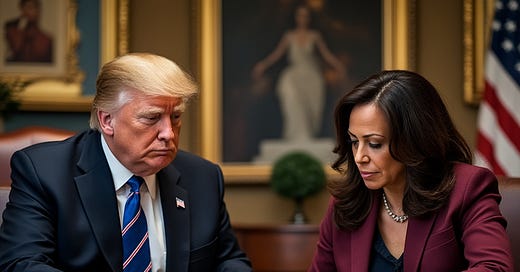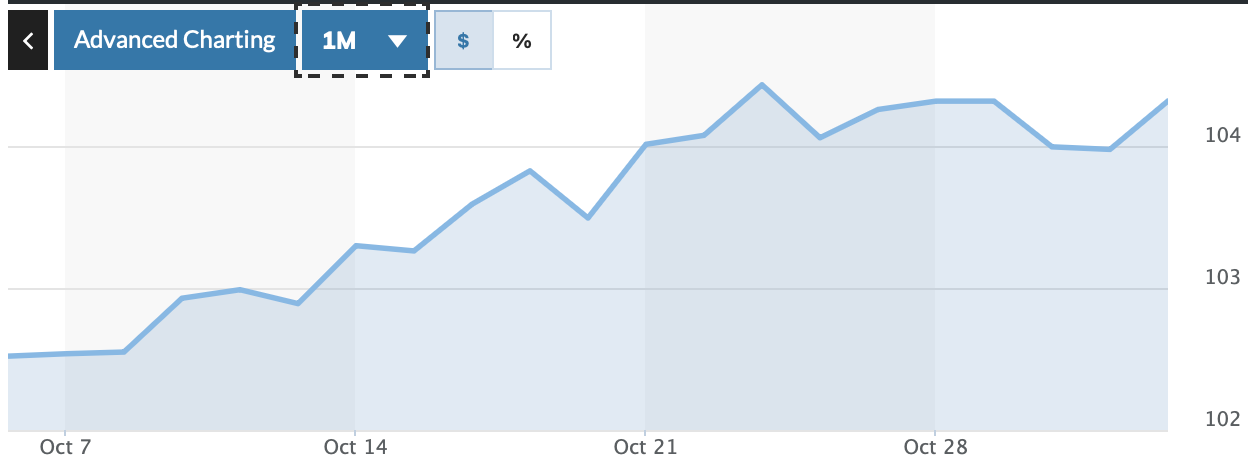U.S. Election And Fed Decision: A Volatile Week Ahead
How will markets react to the Presidential election?
TABLE OF CONTENTS
ECONOMY: Lyn Alden on investing in 2025 amidst growing deficits
COMMODITIES: Mike McGlone sees deflation in commodity markets
TECH: Why more liquidity will flow into tech, according to Jordan Nof
MARKET RECAP
Latest News. Markets are priming for the U.S. election on Tuesday, November 5th. Bloomberg predicts that gold, the U.S. dollar, and Bitcoin could rise in the event of a Trump win, while the yuan, peso, and 10-year Treasury futures would rise if Harris wins. Betting markets such as Polymarket predict that Trump will win, while major polls show a tight race.
Meanwhile, 10-year Treasury yields have been rising since the FOMC’s last rate decision, with markets pricing in higher inflation in the future. Both the Republican and Democratic parties’ fiscal plans are projected to raise the deficit, which could increase the price of goods and services. The Federal Reserve will meet on Wednesday, November 6th, to decide on whether to further cut rates.
Markets are pricing in a 25 bps cut. The current Fed Funds Rate is in the 475 to 500 bps range.
To discuss these developments, we welcomed to the show Keith McCullough, Founder and CEO of Hedgeye Risk Management, who highlighted the recent tumult in Treasury markets. McCullough singled out the MOVE Index, which proxies for Treasury volatility, and said that its recent rise indicates an increased risk of inflation.
“The MOVE Index going vertical is basically the sign that we’re right, that inflation is already reaccelerating,” said McCullough.
McCullough predicted a shift toward “stagflation,” where growth slows and inflation accelerates. Based on Hedgeye’s analysis, he projected that inflation would stay above the Fed’s 2 percent target, and remain “higher for longer.”
“When you have real growth slowing and inflation sticky and rising...that type of environment plays to hard assets,” he said.
In particular, McCullough said that investing in assets like gold, silver, and other commodities would be beneficial. He cautioned against bonds, leveraged small-cap stocks, or riskier credit options.
When it comes to the U.S. elections, McCullough said that Hedgeye does not base its models on specific election outcomes. He nonetheless observed that Trump had offered tax cuts — possibly even eliminating taxes completely and replacing them with tariffs.
“If you have tax cuts like that or anything that really gets off the back of small business in America...there’s no doubt you could see a lot of growth,” said McCullough.
In contrast, he said that a Harris administration would raise taxes and increase government spending, comparing such policies to “modern monetary theory,” and he said that this could increase inflation further.
Market Movements
From October 25 to November 1, the following assets experienced dramatic swings in price. Data are up-to-date as of October 1 at 9pm ET (approximate).
Trump Media & Tech Group (DJT) — down 27.4 percent.
JetBlue Airways — down 20.9 percent.
Natural Gas (Henry Hub) — up 5.9 percent.
Reddit, Inc. — up 38.9 percent.
Lumber — up 4.4 percent.
What follows are the price movements of major assets over the past week.
DXY — up 0.06 percent.
Bitcoin — up 2.5 percent.
Gold — no change.
10-year Treasury yield — up 3.7 percent.
S&P 500 — down 0.9 percent.
Russell 2000 — down 0.1 percent.
USD/yuan — no change.
ECONOMY:
INFLATION IS INEVITABLE
Rick Rule, November 1, 2024
We were joined again by Rick Rule, Founder of Rule Investment Media and Co-Founder of Battle Bank, to discuss the economy and what it means for various asset classes.
Rule said that while the U.S.’s recent economic growth had “exceeded” his expectations, it had not benefited all Americans equally.
“Our economy is becoming a sort of winners-take-all economy,” he said. “People who don’t have contestable jobs, people who are wage-takers and not wage-makers… have had a tough time.”
He added that officially reported inflation rates, using measures like CPI, understate the true rate of inflation. He said that CPI excludes taxes, which comprise a major household expense.
“The idea that a cost-of-living index doesn’t include tax makes it farcical on its face,” Rule said.
He added that “inflation is inevitable,” and that a “slowdown in the economy is likely.” In particular, he predicted that no matter which presidential candidate is elected next week, the government will use deficit spending to fund liabilities like Social Security and Medicare. This, in turn, will increase prices for consumers.
The Federal Reserve is unlikely to be able to control inflation in such a case, according to Rule.
Rule maintained that he is bullish on gold, due to inflationary pressures. He also predicted that nuclear power, and thus uranium, will gain acceptance due to the rising energy demands of tech companies, noting a “sea change” in sentiment towards nuclear.
Rule was particularly bullish on energy over the next five years, foreseeing higher prices due to insufficient capital investment by oil and gas companies. This lack of investment, he warned, could reduce production capacity, similar to past declines in countries like Mexico and Venezuela.
“Unless the oil and gas business...returns to their sustaining capital investments, we will surprise ourselves on the supply side,” he said. “I’m extremely bullish on the energy business in the five-year timeframe.”
ECONOMY:
DEBT CHAOS HITS TOP ASSETS
Lyn Alden, October 29, 2024
Lyn Alden, Founder of Lyn Alden Investment Strategy, joined the show again to provide her diagnosis of the state of the economy, and what it means for various assets.
Alden said that fiscal deficits and monetary policy would drive the investment outlook in 2025. Alden pointed to the debt ceiling suspension expiring in January, which would drive fiscal effects equivalent to “quantitative easing.”
“Draining the TGA [Treasury General Account] is pretty good for liquidity,” said Alden, “It’s not the only variable that affects liquidity, but it’s a meaningful one.”
On the U.S. election, Alden said that a Trump win would cause markets to price in the likelihood of tax cuts, while a Harris win would be more complex to assess.
“I don’t just look at what they’re saying,” said Alden, referring to the presidential candidates. “I look at what they’re going to be able to do with a somewhat mixed Congress... it kind of chops off the tails of what they want to do.”
Given the expected rise in liquidity, Allen said that gold, Bitcoin, and the energy sector would experience bullish trends.
“The handful of times where we see Bitcoin break its correlation with liquidity, it's often due to valuation extremes,” said Alden. “I expect liquidity to go up over next year, and I don't see any signs of extreme Bitcoin valuation... that combination generally leads me to be pretty bullish on Bitcoin.”
Alden also said that there had been a “quality rally” in the stock market, meaning that highly profitable, stable companies—such as those within the S&P 500 and NASDAQ—did well. She contrasts this with unprofitable tech or speculative stocks, which may continue to struggle under current conditions.
“This has been a situation where quality really does matter,” said Alden. “It's not just everything going up; it's things that are profitable or that are the best in class of what they do.”
COMMODITIES:
HOW ELECTIONS WILL STRIKE MARKETS
Mike McGlone, October 28, 2024
We welcomed back Mike McGlone, Senior Commodity Strategist at Bloomberg Intelligence, to provide his take for commodities as markets head into the election.
McGlone views deflationary trends as dominant, especially for commodities, which are seeing declines in demand worldwide.
“The trend in commodities is pretty significantly historically deflationary,” he said. “Industrial metals are lagging, and crude oil is down about 20%.”
He pointed to China’s economic slowdown as a key contributing factor, and said that their recent stimulus had made the economy reliant on government intervention.
“China is doing what Japan did 30 years ago,” said McGlone. “Their GDP is stabilizing, but like Japan, they’re now more reliant on intervention. China’s growth has peaked, and this is pulling down global demand.”
He also pointed to excess supply across commodities, technology, and renewable energy as factors in falling commodity prices. He warned that additional tariffs, especially if implemented by a Trump administration, could amplify deflation by disrupting trade further and forcing economies like China and Europe into deeper recessions.
“The U.S. would be less impacted as a net exporter, but tariffs would deepen the deflation in countries dependent on exports,” said McGlone.
However, McGlone was bullish on gold, attributing its record highs to increased geopolitical tensions and central bank buying.
“Gold is up about 50 percent since February 2022, beating everything,” he observed. “The unlimited friendship and the rapidly heating-up global cold war are number one for gold.”
He said that gold might see a pullback if there is political stability under a Harris presidency, or if the United States and China fix their fracturing relationship, easing geopolitical tensions.
TECH:
THIS IS THE TECH SELLOFF TRIGGER
Jordan Nof, October 31, 2024
Jordan Nof, Co-Founder and Managing Partner at Tusk Venture Partners, joined the show to discuss the tech landscape, venture capital trends, and factors that could derail the rally in tech. In general, Nof was optimistic about tech’s outlook.
Nof said that falling rates could improve liquidity by encouraging risk-taking and increasing acquisition activity. However, he said that increased FTC scrutiny has created a barrier to mergers and acquisitions.
“The FTC’s posture, people feel, has put a wet blanket on the market,” he said. “But that drives really important liquidity to venture funds like ours.”
He added that there has been more competition among tech startups for Series A funding, leading venture capital firms to be far more selective.
“The bar for quality is just much, much higher now,” Nof said. “The Series A now is happening at a much larger size, around $20 million at this point...with metrics at that stage looking a lot more like what Series B did five years ago.”
Addressing high valuations of major tech companies like Nvidia, Nof foresaw both risks and long-term growth potential. He said that valuations are high, and predicted that interest rate changes and momentum shifts could trigger corrections.
“The multiples that we're talking about right now are really, really high,” he observed. “Momentum coming out of the market or a rotation out of large-cap names could be enough to see a pullback.”
However, he predicted growth in tech sectors focused on healthcare, fintech, supply chain, and public safety.
WHAT TO WATCH
Tuesday, November 5, 2024
U.S. Election. Elections for the President of the United States, House of Representatives, and 34 Senate seats will take place.
Reserve Bank of Australia Monetary Policy Decision: The Reserve Bank’s Board will release its decision on interest rate policy.
Thursday, November 7, 2024
Federal Open Market Committee Meeting: The FOMC will meet to decide on interest rate policy, in particular the path of the Fed Funds Rate.
Bank of England Monetary Policy Committee Meeting: The Bank of England’s MPC will decide on interest rate policy.

















Addressing Mr McGlone's comments: the US is a net importer, not a net exporter. This means that if Trump wins and increase/adds tariffs, consumers will be worse off leading to probable deflation as they spend less on imports. However, higher tariffs will lead to higher prices set by those US companies competing against imports with locally produced products.